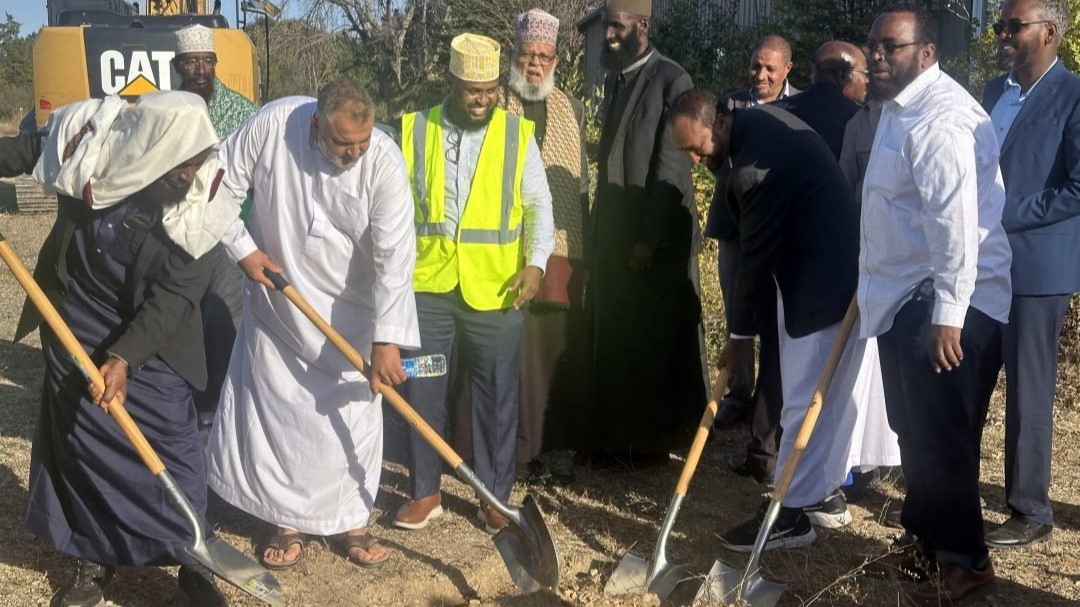
Muslim cemetery in Dakota County breaks ground after legal battles, vandalism
After nearly a decade’s worth of delays, a sprawling Muslim cemetery is coming to Dakota County.
The Al Maghfirah Cemetery, which officially broke ground Tuesday at 1120 W. 220th St., will be the largest Muslim-exclusive cemetery in the state at some 72 acres in Castle Rock Township, according to the Minnesota chapter of the Council on American-Islamic Relations.
The cemetery was designed to serve the Muslim community for the next 100 years and will include prayer rooms and facilities for ritual washings, “ensuring the full observance of Islamic funeral rites,” according to CAIR-MN.
“This moment should have come a lot sooner than 10 years,” said Jaylani Hussein, executive director of CAIR-MN, at Tuesday’s groundbreaking ceremony.
What took so long?
The first obstacle for the southern Dakota County land, which was purchased in 2014 by the Al Maghfirah Cemetery Association, came when officials from Castle Rock Township rejected a land-use application.
Township officials cited concerns over the loss of a tax base and beliefs that the cemetery would be “incompatible with the current and surrounding uses.”
In 2015, Muslim leaders filed a lawsuit alleging religious discrimination and during that time, township officials went as far as to change the zoning ordinance of the land so that cemeteries were not permitted.
Less than a year later, a Dakota County district judge ruled that the township must issue a permit to the Al Maghfirah Cemetery Association and said the township board of supervisors’ decision to deny the initial permit was “arbitrary and capricious.”
Despite receiving the necessary permits, the cemetery continued to face opposition in the following years.
Graffiti and vandalism found at Al Maghfirah cemetery in Castle Rock Township in 2017, according to CAIR-MN, which asked the incident be investigated as a hate crime. (Courtesy of CAIR-MN)
Vandals targeted the area in 2017, damaging walls and furniture, spray-painting swastikas and one message that said “Leave, you R dead.”
The site was again vandalized in 2021, when gas lines and electrical wires were cut, windows were broken and dozens of tires were dumped inside a building on the cemetery’s site.
Finally in 2022, Castle Rock Township granted a conditional use permit to allow the cemetery to develop burial plots and a funeral home, the Sahan Journal reported.
‘Our community is resilient’
“We faced hurdles … We also faced a number of attacks against this facility which caused damages over $200,000,” Hussein said Tuesday. “Today we show love wins and our community is resilient and we will continue to persevere.”
Hussein also noted that the name of the cemetery, Al Maghfirah, means “forgiveness” in Arabic.
Related Articles
Hastings well tied to 3M ‘forever chemical’ pollution qualifies for settlement cleanup money
Some residents want to keep the ‘farm’ in Farmington as developer pitches data center park
Angie Craig, Joe Teirab spar on abortion, inflation, immigration in MPR debate
West St. Paul YMCA site eyed for mixed-use redevelopment
MN attorney general files fraud lawsuit against developer behind Lakeville housing project aimed at Somali-Americans
“As we leave behind and lay to rest our loved ones … it will be a place of tremendous pain and sorrow, but also tremendous hope and connection to our community,” Hussein said.
Minnesota already has two cemeteries for Muslims. One in Roseville is at capacity, Hussein said; the other in Burnsville quickly reached capacity and more space was added. “The idea of having a Muslim-owned cemetery was a dream of the Muslim community dating back to as early as the 80s,” Hussein said.
“This cemetery will serve the needs of Muslims all over the Twin Cities metro area,” writes the Al Maghfirah Cemetery Association on its website. “Though the Muslim community in Minnesota has a long history, only recently our burials, according to Muslim rights, have the chance and the hope of becoming possible.”


